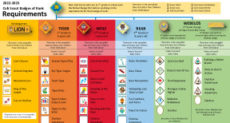 Did you know much about leadership before becoming a Scout leader?
Did you know much about leadership before becoming a Scout leader?
Perhaps you did, if you were a Scout as a youth, or you were a class officer, team captain, or president of your JA company. In the work world, you may have picked up leadership skills through job responsibilities or possibly even formal training. And certainly, the military develops leaders.
For many people, though, taking on a leadership role in a Scout unit is our first exposure to leadership. We quickly learn that while leaders are responsible for many things, the only way to cope is often to enlist the help of others and give them the tools and resources they need.
Have there been any big takeaways from your Scout leadership that apply in the world outside Scouting? Has being a Scout leader made you a better leader overall?
Of course it has. In a recent article in the SmartBlog on Leadership, Karin Hart illustrates why volunteers make better leaders. Volunteering, Hart says, changes your perspective by taking you out of your comfort zone, throws you in with people with different life experiences, and gives you new challenges.
Volunteering also frees you to try new methods, ideas or concepts that you might not be comfortable trying at work or in your family. You can experiment with a different approach than you’d normally take, and have the opportunity to try creative problem solving. It frees you to fail constructively and improve from your failures, whereas failure at work might be discouraged or be an outright reason for dismissal.
You can also broaden your circle of associates through volunteering. You’ve probably met folks from all walks of life, learned about their families and careers, and heard some interesting stories, both from within Scouting and outside of it. You’ve met people who work in many different fields, and have possibly built up your own personal network. You have probably met people of different faiths and even different religions as yourself, and grown to understand and respect them better for it.
Best of all, being a Scout volunteer gives you access to some of the best leadership training around at a very reasonable cost – free, in many cases, or at a fraction of the cost of comparable corporate training. While basic leader training mainly imparts the essential information for someone in a new position, those who have taken the next step and completed Wood Badge can attest that the lessons and experiences are comparable to business leadership development. Better yet, the cost is kept extremely low thanks to the volunteers who conduct the course. Wood Badge training is so important that even Scouting professionals are encouraged to take it. And while teaching boys the tools of leadership, you can’t help but sharpen your own skills as well.
As you grow as a Scout leader, your increased leadership skill benefits you at your day job, in your family, and in other endeavors such as church or community groups. It’s common to Scouting – the lessons we learn carry far beyond our units, both for the boys and for the adults.
So next time you step forward and volunteer to do something, recognize the leadership lessons you’ve learned and where they’ve come from, and how Scouting made you more comfortable doing so.
Image courtesy of jscreationzs / FreeDigitalPhotos.net
This post first appeared on Bobwhite Blather.




There can be some amount of false feedback in a professional life where you are leading people who, on some level, are – ‘paid’ – to listen to you, attend your meetings, read your messages. In Scouting, you quickly find that volunteers attend your meetings… or not; read your messages… or not; help you out… or not. Based on your abilities as a leader and communicator, yes, but moreso based on the efforts of an entire group and the way they see the larger cause.